These days Cobb County is in the news for its large-scale building projects, notable film locations, award-winning entertainment venues and healthy stock of Fortune 500 companies. With such a flurry of activity swirling around the Cobb of today and tomorrow, it’s hard to believe that less than 50 years ago Cobb was little more than a bedroom community with wide swaths of farmland dotted by barns, small town squares and corner gas stations.
Though Cobb has changed dramatically in the ensuing years, and more IT experts than farmers now call the county home, the Cobb of yesterday can still be seen in the newly restored town squares nestled beside towering modern high-rises and bustling office parks. This remarkable juxtaposition of new and old, modern and pastoral, community charm mixed with business acumen, is what makes Cobb County such a popular destination to live, work and play.
Location, Location, Location
 The story of Cobb County is largely the story of Atlanta—a sleepy Southern locale brought to life with the help of the South’s most powerful transportation asset—Hartsfield-Jackson Atlanta International Airport. Coming of age in the 1950s, Hartsfield soon became the busiest airport in the country, and later, the world. Serving tens of millions of passengers every year, the airport’s unparalleled access lured big business, entrepreneurial investors and thousands of people escaping the diminishing opportunities of the Rust Belt. Situated less than 30 minutes northwest of Atlanta, Cobb County soon became a go-to destination for families looking for lots of land, affordable housing and safe neighborhoods.
The story of Cobb County is largely the story of Atlanta—a sleepy Southern locale brought to life with the help of the South’s most powerful transportation asset—Hartsfield-Jackson Atlanta International Airport. Coming of age in the 1950s, Hartsfield soon became the busiest airport in the country, and later, the world. Serving tens of millions of passengers every year, the airport’s unparalleled access lured big business, entrepreneurial investors and thousands of people escaping the diminishing opportunities of the Rust Belt. Situated less than 30 minutes northwest of Atlanta, Cobb County soon became a go-to destination for families looking for lots of land, affordable housing and safe neighborhoods.
Soon, Cobb County became a mecca for Fortune 500 companies like Coca-Cola, Genuine Parts (NAPA) and The Home Depot, as well as other major employers like Lockheed Martin, GE Energy and Heidelberg USA. “The most noticeable thing about Cobb County is how much it has grown over the past 20 years,” says Mike LaFerle, vice president of real estate for The Home Depot. “Having access to a major international airport makes Atlanta the hub for the Southeast. For most major companies, it is important to be close to an international airport with non-stop access to major cities like New York, Chicago and Los Angeles.”
Besides the innumerable benefits of having the world’s busiest airport less than an hour away, LaFerle also lauds Cobb County’s access to some of the best highways in the country, with I-285, I-75 and I-20 bisecting the county, and I-85 and GA 400 nearby. “We have a significant distribution center in South Atlanta,” says LaFerle, “and the major highway network allows us to move our products all over the Southeast.”
Perennially ranked one of the best road systems in the country, Georgia was recently rated No. 2 in infrastructure and transportation by CNBC. Cobb County also has quick access to Georgia’s 4,700 miles of super cargo railway, and the deep-water seaports of Savannah and Brunswick are about four hours away. With great shipping access, a major highway network, an international airport and shipping giant UPS calling the region home, it is no surprise that Cobb County business has grown exponentially in recent years.
Prepared for Success
While a strategic location with close proximity to a major highway network and the nearby city of Atlanta accounts for much of the county’s success, Cobb is also known for having one of the most educated and affluent populations in the region. Ranking among the highest in the state, Cobb County residents have a median household income of nearly $70,000. High salaries correlate with higher housing prices and healthy property taxes, which fund the top-rated Cobb County and Marietta City School Districts, home to nine nationally ranked high schools that received gold, silver or bronze medals in U.S. News & World Report’s “Best High Schools” issue.
“Cobb is attractive because it has very good school systems and very good colleges, which is a strong draw for employees and their families,” says LaFerle. “Really great learning establishments produce top-quality employees.” Cobb County’s high salaries and strong primary schools correlate with another astounding statistic—42 percent of Cobb County residents have a bachelor’s degree or higher, making Cobb the most educated county in Georgia. With strong ties to companies like Lockheed, which employs a highly educated labor force of scientists, engineers and technologists, it is no surprise that Cobb County has one of the metro area’s lowest unemployment rates.

When it comes to college, Cobb’s well-prepared high school graduates have their choice of some of the state’s best universities, including nearby Georgia State, Georgia Tech and the University of Georgia, as well as Kennesaw State University, Southern Poly, Chattahoochee Technical College and Life University right at home, making the county a hotspot for young, educated professionals. “We are always sourcing college graduates and MBAs from the labor pool—everything from IT to logistics to finance associates,” says LaFerle. “It’s tremendous to have this level and diversity of education in one area because the more specialized the education, the better the labor pool is for companies.”
A well-educated talent pool, combined with a low cost of living, are the biggest reasons why the Atlanta region was recently ranked the ninth “Best City for Young Professionals” by Forbes.com and the No. 4 “Best City for College Grads” by Bloomberg Businessweek. Undoubtedly, Cobb’s affluent tax base of well-educated parents creates talented kids who go on to become the next wave of highly skilled workers. “Cobb invests heavily in the education of its workforce and creates highly qualified labor for businesses,” says Dr. Richard M. Franza, associate dean of academic affairs for Kennesaw State University’s Coles College of Business. “Companies move for various reasons, but if a certain location has a rich pool of labor, they don’t have to spend money to recruit workers.”
The MBA Advantage
In addition to talented college graduates of every discipline, Cobb County is also home to Kennesaw State University’s Coles College of Business, which was recently ranked the No. 2 “Best MBA Program” in the state by CEO magazine and No. 22 in the entire country. Tracking the evolution of Cobb County, Kennesaw State University has nearly doubled in size in less than a decade, earning accolades and creating robust graduate programs. “With the HOPE scholarship, and by virtue of being located where we are, the quality of the institution has gone up significantly,” says Franza. “We have become much more of a school of choice for the people of Cobb County.”
With part-time MBA classes conveniently offered at the main campus and near the Perimeter at the Cobb Galleria, KSU has certainly become the school of choice for full-time workers looking to advance their business careers without having to drive into the city. “We are affordable and convenient, but none of that matters if you aren’t good,” says Franza. “Our MBA program has become better instead of bigger, and we have raised the bar by admitting more highly qualified students into the program every year. While Coles College has evolved over time, our MBA students are looking to accelerate upward mobility, retool and change industries or perhaps move up in the companies they are already in.”
With 80 percent of Coles MBA graduates looking to stay close to Cobb after graduation, the real returns on having a top-rated MBA program in the heart of Cobb County are reaped by the local business community. “One of our major strategic thrusts at Coles College is to interact more with Cobb businesses through consulting and engaging with companies,” says Franza. “We are listening to the business community and creating the types of workers businesses want to hire. And in the future, we at Coles expect to contribute more to the economic growth of the county through the creation of an entrepreneurial center that focuses on developing and growing new businesses and creating job opportunities.”
Designed for Business
In addition to top-notch infrastructure and a highly skilled, affluent workforce nurtured by excellent public schools, great universities and MBA advancement, Cobb County has a pro-business climate engineered for success. Metro Atlanta’s economy ranks an astounding 15th among world cities and sixth in the nation, garnering a gross domestic product of $270 billion. Coupled with favorable tax rates and a fiscally sound pro-business government, Cobb County is one of the few of counties in the nation with a triple-A bond rating from all three credit rating agencies.
Consistently rated one of the best places for entrepreneurial activity, and one of the top five most wired cities in America, Atlanta boasts more than a dozen Fortune 500 companies, but it runs on the energy of small businesses, franchises and young entrepreneurs. Well known for its innovation, low cost of business and economic dynamism, Atlanta was recently ranked the No. 7 “Best Start Up City” by Entrepreneur magazine. With one in three workers between the ages of 25 and 44, Cobb County is well positioned to reap the rewards of its innovative, young workforce.
While Expansion magazine rated Georgia’s Quick Start program the nation’s top workforce training program, the state is also well known for aggressive business incentives for innovation, research and development, films and quality jobs. Tax policies like enterprise zones, redevelopment sites and “Single Factor Gross Receipts,” which treats a company’s gross sales as the only relevant factor in determining taxable income, Georgia was voted the 25th most business-friendly tax climate by the Tax Foundation in 2011.
Rounding out the list of pro-business policies, Cobb County has the lowest overall tax rate and regularly waives fees related to structural reviews, development impact, system development, building permits and business licenses. “Starting my own business was one of the scariest and best times of my life,” says Wendy Bunch, broker and owner of RE/MAX PURE, located in the heart of the Marietta Square. “I really benefited from the community support of local businesses, county officials and the Cobb County Chamber of Commerce.”
With the help of networking and a supportive, pro-business climate primed for start-ups, Bunch was recently named one of the Cobb Chamber’s Top 25 Small Businesses of the Year. “It was wonderful to be honored in that realm with so many other great businesses,” says Bunch. “Networking with other companies and the local community is instrumental because opportunities come along that can have a huge impact on growing your business.”
To help spur economic development even more, Cobb leaders have joined forces to create Cobb’s Competitive EDGE, a seven-point, public-private economic strategy for job creation that is expected to create 7,500 new jobs, generate more than $640 million in annual economic impact and increase disposable income by $512 million and consumer spending by $445 million.
A Great Place to Call Home
While entrepreneurial opportunities, great career options and access to excellent education draw people to Cobb County, the quality of life and sense of community persuade them to stay for generations. With top-rated hospitals, one of the lowest crime rates in the state and one of the lowest millage rates in metro Atlanta, Cobb County is the perfect place to find safe and affordable housing. From luxury apartments and turnkey condos to picturesque subdivisions and gorgeous horse farms, Cobb has a home to suit every buyer. “As a real estate agent, I work with everyone from first-time homebuyers and business executives to relocating grandparents,” says Bunch. “All of them are looking for Cobb’s great quality of life. They want to feel good about going to work and coming home to a sense of community.”
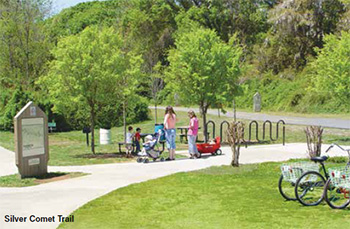 Besides affordable home prices and a great diversity of housing, Cobb’s excellent quality of life extends to its fantastic parks, including sports and recreation centers, top-notch YMCAs, the 60-mile Silver Comet Trail and the sprawling wilderness of Kennesaw Mountain National Battlefield Park. “The natural terrain is very green and pretty,” says LaFerle, who notes that 80 percent of the 11,000 Home Depot associates who work in the county also call Cobb home.
Besides affordable home prices and a great diversity of housing, Cobb’s excellent quality of life extends to its fantastic parks, including sports and recreation centers, top-notch YMCAs, the 60-mile Silver Comet Trail and the sprawling wilderness of Kennesaw Mountain National Battlefield Park. “The natural terrain is very green and pretty,” says LaFerle, who notes that 80 percent of the 11,000 Home Depot associates who work in the county also call Cobb home.
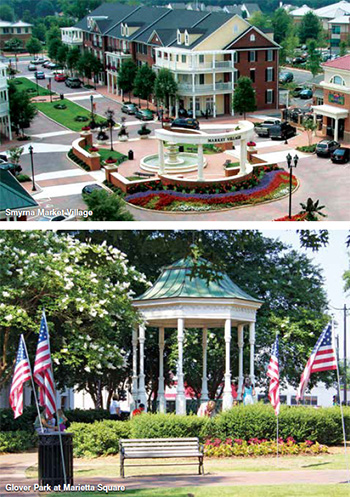 In addition to verdant parkland and well-groomed sports fields, Cobb County boasts a diverse restaurant scene and a resurgent small-town culture that harkens back to the county’s earliest days. Once again, the downtown squares of Acworth, Austell, Kennesaw, Marietta, Smyrna and Powder Springs are coming to life with independent restaurants, breweries, home décor stores, ice cream shops and theaters. “I love seeing all of our small town squares thrive,” says Bunch. “I love going to all the food tastings, food truck events and the free arts and entertainment festivals. There is so much a family can do in Cobb County.”
In addition to verdant parkland and well-groomed sports fields, Cobb County boasts a diverse restaurant scene and a resurgent small-town culture that harkens back to the county’s earliest days. Once again, the downtown squares of Acworth, Austell, Kennesaw, Marietta, Smyrna and Powder Springs are coming to life with independent restaurants, breweries, home décor stores, ice cream shops and theaters. “I love seeing all of our small town squares thrive,” says Bunch. “I love going to all the food tastings, food truck events and the free arts and entertainment festivals. There is so much a family can do in Cobb County.”
Besides summer soccer, mountainous hikes and small town charm, Cobb also has access to innumerable shops and restaurants at Cumberland Mall, the Cobb Galleria and Town Center Mall in Kennesaw. “Infrastructure improvements also improve productivity and quality of life, and Cobb County deserves credit for the Cumberland CID and the Town Center CID, which aim to improve the infrastructure and make the areas more attractive to both Cobb residents and Cobb businesses,” says LaFerle. “The Home Depot is very pleased with our relationship with Cobb, and going forward it will continue to grow.”
The World Comes to Cobb
In the 1960s, people flocked to Cobb County for only one reason—the 300-acre thrill park known as Six Flags Over Georgia. Decades later, tens of thousands of tourists visit the county every year to discover what Cobb residents already know—the county is continually adding new entertainment venues, state-of-the-art infrastructure and top-rated talent that rivals anything offered inside the Perimeter.
One of Cobb’s most ambitious projects to date is the construction of the Cobb Energy Performing Arts Centre, where world-class entertainers and arts companies regularly perform. In 2007, the Atlanta Opera left their long-time home at the Atlanta Civic Center to move to the Cobb Energy Center. “We decided to move because the Cobb Energy Center is the most ideal venue in the city,” says Tomer Zvulun, general and artistic director for the Atlanta Opera. “It has great acoustics and it’s simply one of the best, most state-of-the-art theaters in the United States.”
Since the company’s relocation, the Atlanta Opera’s audience and subscription base has grown by 50 percent. “Half of our audience lives in the northern part of the city, so now it’s easier for them to come and see opera in the best way possible,” says Zvulun, who adds that the company generates $39 million in economic impact. “People come to see opera, but they also spend money on hotels and restaurants. We have a vision of becoming a hub for opera in the Southeast and people in cities two hours away—Nashville, Chattanooga, Greenville—will come for opera and stay for shopping, hotels and restaurants, which are all available nearby in the Cobb Galleria area.”
The ability to be closer to affluent, ticket-buying audiences in the northwest region of the city is one of the reasons why the Atlanta Ballet has also expanded its reach to the Cobb Energy Center, and one of the main reasons why Cobb County made national headlines with the announcement that the Atlanta Braves would follow their loyal fan base and build a $700 million stadium near the Cobb Galleria, that opened in 2017. “Cobb County has been fairly proactive over the years in building infrastructure that will be attractive to venues,” says LaFerle, “and the more attractive the county becomes to entertainment entities, the more attractive it becomes to residents and employers.”
For all the headlines and controversy the Braves’ move generated, Bunch is optimistic about what the change will mean for Cobb County residents and businesses. “I think this is huge—one of the biggest things to come to Cobb in a long time,” she says. “It will continue to bring more businesses, more job opportunities and I think it will have a huge impact on tourism and hotels in terms of bringing in dollars. I just love my county and the people in it and I want to see it succeed. We have great officials who continue to grow the county in every possible way.”
Business Builds Community
A booming nexus of industry, profit and entertainment, Cobb County is also known for its unique blend of business and community—a place where companies large and small come together to support health care, education and charities like MUST Ministries. While Cobb is now home to world-class companies and top-notch entertainment venues, when it comes to giving back, Cobb County retains a system of values that reflect its small town roots.
“It’s nice living [in a place] with a sense of community and home,” says Bunch. “When you learn about all the wonderful charities in the county, you wish you could give to all of them. Even during the economic downturn, companies retooled and rearranged just so they could continue to give back.” Since 2006, The Home Depot Foundation has donated $2.5 million to Cobb charities like Habitat for Humanity of Northwest Atlanta, United Way of Cobb County and Cobb County Housing Incorporated.
“I think Cobb County is a great place to live because there are a lot of people involved in making it an even better place,” says Franza. “Businesses have a vested interest in giving back to the community and making the public schools even better. Companies here are not just about profits, but also about what they can do to help the community. In the past, Atlanta has been known as a transient place, but Cobb County is really a community where people care about each other, so inherently, business, education, charity and community link up for the betterment of everyone.”













 The story of Cobb County is largely the story of Atlanta—a sleepy Southern locale brought to life with the help of the South’s most powerful transportation asset—Hartsfield-Jackson Atlanta International Airport. Coming of age in the 1950s, Hartsfield soon became the busiest airport in the country, and later, the world. Serving tens of millions of passengers every year, the airport’s unparalleled access lured big business, entrepreneurial investors and thousands of people escaping the diminishing opportunities of the Rust Belt. Situated less than 30 minutes northwest of Atlanta, Cobb County soon became a go-to destination for families looking for lots of land, affordable housing and safe neighborhoods.
The story of Cobb County is largely the story of Atlanta—a sleepy Southern locale brought to life with the help of the South’s most powerful transportation asset—Hartsfield-Jackson Atlanta International Airport. Coming of age in the 1950s, Hartsfield soon became the busiest airport in the country, and later, the world. Serving tens of millions of passengers every year, the airport’s unparalleled access lured big business, entrepreneurial investors and thousands of people escaping the diminishing opportunities of the Rust Belt. Situated less than 30 minutes northwest of Atlanta, Cobb County soon became a go-to destination for families looking for lots of land, affordable housing and safe neighborhoods.
 Besides affordable home prices and a great diversity of housing, Cobb’s excellent quality of life extends to its fantastic parks, including sports and recreation centers, top-notch YMCAs, the 60-mile Silver Comet Trail and the sprawling wilderness of Kennesaw Mountain National Battlefield Park. “The natural terrain is very green and pretty,” says LaFerle, who notes that 80 percent of the 11,000 Home Depot associates who work in the county also call Cobb home.
Besides affordable home prices and a great diversity of housing, Cobb’s excellent quality of life extends to its fantastic parks, including sports and recreation centers, top-notch YMCAs, the 60-mile Silver Comet Trail and the sprawling wilderness of Kennesaw Mountain National Battlefield Park. “The natural terrain is very green and pretty,” says LaFerle, who notes that 80 percent of the 11,000 Home Depot associates who work in the county also call Cobb home. In addition to verdant parkland and well-groomed sports fields, Cobb County boasts a diverse restaurant scene and a resurgent small-town culture that harkens back to the county’s earliest days. Once again, the downtown squares of Acworth, Austell, Kennesaw, Marietta, Smyrna and Powder Springs are coming to life with independent restaurants, breweries, home décor stores, ice cream shops and theaters. “I love seeing all of our small town squares thrive,” says Bunch. “I love going to all the food tastings, food truck events and the free arts and entertainment festivals. There is so much a family can do in Cobb County.”
In addition to verdant parkland and well-groomed sports fields, Cobb County boasts a diverse restaurant scene and a resurgent small-town culture that harkens back to the county’s earliest days. Once again, the downtown squares of Acworth, Austell, Kennesaw, Marietta, Smyrna and Powder Springs are coming to life with independent restaurants, breweries, home décor stores, ice cream shops and theaters. “I love seeing all of our small town squares thrive,” says Bunch. “I love going to all the food tastings, food truck events and the free arts and entertainment festivals. There is so much a family can do in Cobb County.”


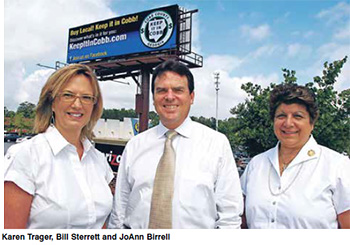 When Birrell hit the campaign trail, she discovered that the county spends between $7 million and $8 million annually in purchase-order projects of less than $2,000 each. “These projects don’t have to be bid out,” she says. “I didn’t realize that, and I’m sure small business owners didn’t either, so we began looking for ways to encourage local businesses to register online as vendors.”
When Birrell hit the campaign trail, she discovered that the county spends between $7 million and $8 million annually in purchase-order projects of less than $2,000 each. “These projects don’t have to be bid out,” she says. “I didn’t realize that, and I’m sure small business owners didn’t either, so we began looking for ways to encourage local businesses to register online as vendors.”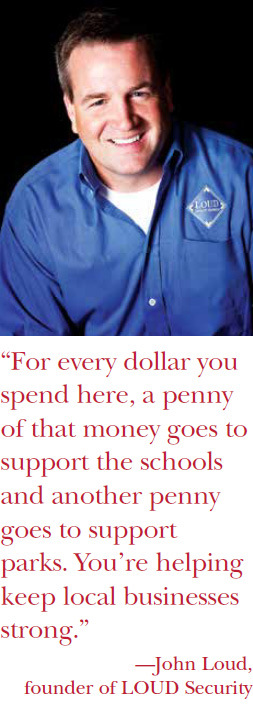 John Loud, founder of LOUD Security is another success story, but his experience cuts both ways. Not only does his company do work for the county, but he’s committed to supporting local businesses as well. About a year ago, he and his staff attended a security conference in California and employees encouraged him to purchase nice jackets for their brand to take home and wear on the job.
John Loud, founder of LOUD Security is another success story, but his experience cuts both ways. Not only does his company do work for the county, but he’s committed to supporting local businesses as well. About a year ago, he and his staff attended a security conference in California and employees encouraged him to purchase nice jackets for their brand to take home and wear on the job.
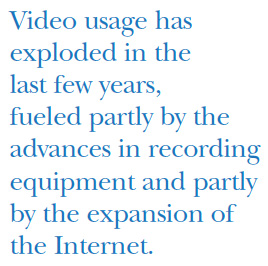
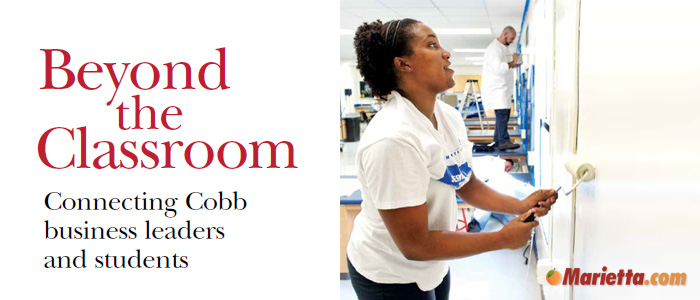

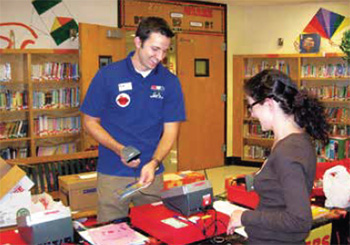 The Partners in Education program was started by the Cobb County Chamber of Commerce as well as the Cobb County and Marietta City school systems in 1986 when a group of educators and local business leaders saw the need for community involvement in schools. Designed to meet the needs of local schools through the resources of community partners, these support systems benefit both organizations and the entire community. At its inception, the program began with four businesses working with a school, and has grown to include more than 1,300 partnerships in the past 27 years.
The Partners in Education program was started by the Cobb County Chamber of Commerce as well as the Cobb County and Marietta City school systems in 1986 when a group of educators and local business leaders saw the need for community involvement in schools. Designed to meet the needs of local schools through the resources of community partners, these support systems benefit both organizations and the entire community. At its inception, the program began with four businesses working with a school, and has grown to include more than 1,300 partnerships in the past 27 years.

